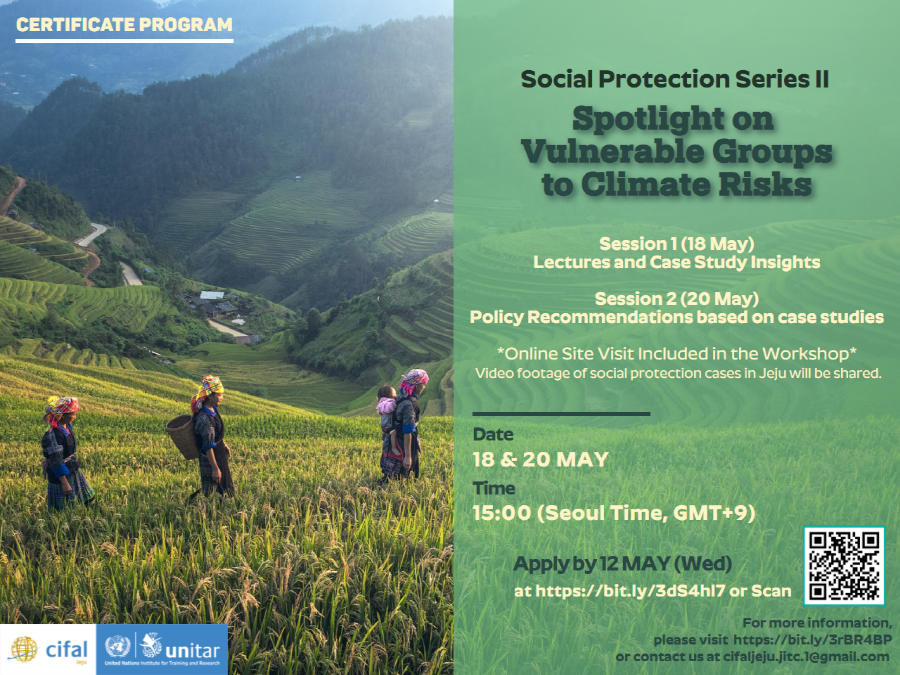
 2021.03.31
2021.03.31
|
Social Protection Series II - Spotlight on Vulnerable Groups to Climate Risks - 18 & 20 May 2021 Two online sessions: Expert Lecture & Case
Study Insights Certificate Program Background
Climate change along with the COVID-19 pandemic poses a serious challenge
to implementing Sustainable Development Goals. In the 2019 United Nations
Climate Change (COP25) conference, UN Secretary-General António Guterres stated that the planet has come near “the point of no return” and
this is “critical time” to combat climate change.[1]
According to the World Economic Forum Global Risks Perception Survey released in
2020, climate-related risks by likelihood and impact accounted for half of the top
10 risks to be encountered by the global community over the next 10 years.[2]
Climate change globally recognized as one of the major threats to sustainable
development is accelerating disproportionate impacts on different countries and
social groups since it largely takes a toll on vulnerable people, communities,
and countries. The poor living in rural areas whose livelihoods heavily depend
on natural resources are easily exposed to the damaging effects of climate
risks such as floods, droughts, and extreme changes in temperature. Their low
incomes, lack of savings, and unstable livelihoods exacerbate the vulnerability
to climate hazards. The poor in geographical locations highly vulnerable to
climate change, as well as other marginalized groups including women and
migrants, struggle with much higher income losses in the wake of disasters and the
areas hit hard by disasters experience higher mortality rates.
The World Bank said that the pressures of climate change and conflict
combined with the COVID-19 pandemic could put the goal of leaving no one behind
by 2030 out of reach without prompt, substantial and determined policy action.[3]
In order to develop adaptive strategies in particular for vulnerable groups to
climate risks, a wide range of climate-resilient plans must be in line with interventions
that reduce vulnerability to poverty. In this regard, Disaster Risk Reduction(DRR)
and Climate Change Adaptation(CCA) management strategies might not be
sufficient if those strategies are not incorporated into the efforts to address
underlying causes of chronic poverty facing the vulnerable groups living in
disaster-affected areas.
It is critical to strengthen the integration between climate risk
management and poverty reduction strategies. This calls for a wider
developmental approach, where social protection can play a significant role in
safeguarding vulnerable groups to climate shocks. Social protection can complement
programs and strategies developed to reduce vulnerability to climate risks and to
enhance adaptive capacity by helping vulnerable groups escape poverty and less
rely on negative coping strategies, providing a pathway towards
climate-resilient livelihoods, and supporting inclusive responses to climate risks.[4]
With the role of social protection in reducing vulnerability to climate
risks and poverty in mind, UNITAR CIFAL Jeju organizes its second social
protection series workshop with focus on vulnerable groups to climate risks. This
online event will take stock of who are most vulnerable in the context of
climate risks and how social protection can contribute to managing climate
risks and reducing vulnerability to poverty. The event will also discuss key
challenges and opportunities for integrating social protection and climate risk
management. The workshop is composed of two online sessions: one with expert
lectures and case study analysis through group discussion, and the other with
case study presentation by participants as well as expert inputs.
Objectives To provide a platform
for good practices and lessons learned To explore how social
protection can be integrated into climate risk management and contribute to
reducing vulnerability to both climate shocks and poverty To analyze case
studies on climate risk management through social protection and gain
professional inputs for better designing and implementing a social protection plan
towards resilient livelihoods of vulnerable groups to climate risks
Expected Outcomes Better understanding
of who the vulnerable groups to climate risks are Sharing policy
strategies implemented in different cities/countries to reduce vulnerability to
disasters and enhance adaptive capacity of the vulnerable groups Policy
recommendations shared through case study analysis and expert inputs
Target Audience
This program is open
to national and local government officials and practitioners from CSOs and
institutions who have been working in the DRR/CCA Management and supporting sustainable
development.
Program Structure
* All online sessions will begin at 15:00
(Seoul Time, GMT+9).
* Please see the
final page for the program details.
Requirements
Selected
participants are required to: submit assignments
on time - e.g. case study in both Word and PPT format actively
participate in the training program be fluent in written and spoken English
* Applications will be
screened, and successful applicants will be asked to engage at least for two
hours on the designated time and dates.
Application and deadline
Send the following two documents to cifaljeju.jitc.1@gmail.com by 12 May 2021 (Wednesday)
*Kindly note that only selected applicants
will be notified individually.
Organizer
UNITAR CIFAL Jeju/Jeju International Training
Center
Certificate A Certificate of Completion will be awarded to those who
have completed two online sessions and fulfilled the required tasks for the
program – e.g. group discussion and presentation on case studies Once completed, the
participants will be awarded a certificate jointly issued by UNITAR and UNITAR
CIFAL Jeju.
Program Details
- All two online
sessions will begin at 15:00 (Seoul Time, GMT+9).
* The above program is subject to change.
[1]Manzanaro, S. S. 2019, Euronews. Available at
https://www.euronews.com/2019/12/02/live-un-leaders-and-delegates-arrive-in-madrid-for-the-climate-change-summit
[2] The Global Risks Report 2020, World Economic
Forum. Available at https://www.weforum.org/reports/the-global-risks-report-2020
[3] COVID-19 to Add as Many as 150 Million
Extreme Poor by 2021, World Bank, Press Release. Available at https://www.worldbank.org/en/news/press-release/2020/10/07/covid-19-to-add-as-many-as-150-million-extreme-poor-by-2021
[4] Managing Climate Risks
through Social Protection, FAO 2019. Available at http://www.fao.org/social-protection/resources/resources-detail/en/c/1250961/
|







